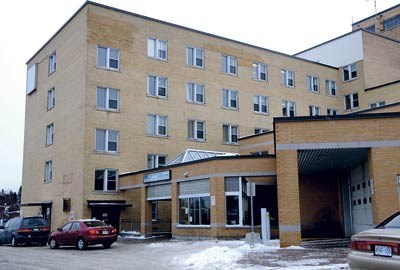John Lindsay doesn’t care what name health care officials give it, but he’s happy up to 75 patients will be able to stay in part of the former Memorial Hospital until at least the late summer.
The president of the local seniors’ group Friendly to Seniors — Sudbury has been advocating for the transitional care unit at Memorial to stay open beyond its scheduled March 31 closing date.
Sudbury Regional Hospital has agreed to temporarily fund up to 75 beds at the Memorial site after March 31, but as a facility which will instead called a “surge unit.”
This facility will take care of alternate level of care (ALC) patients who no longer need acute care, but are waiting for services such as home care or rehab beds.
The unit is meant to relieve issues at the hospital, such as the cancellation of surgeries and an overcrowded emergency room, caused by these ALC patients.
The hospital made the decision to fund the surge unit after receiving a recommendation to do so from the Sudbury ALC Steering committee.
Memorial has been housing about 130 ALC patients who are mostly destined for long-term care facilities since early 2010.
The impending opening of the new St. Gabriel Villa long-term care home and interim beds at Pioneer Manor are to assist with the placement of these patients.
“They call (what’s opening at Memorial after March 31) a surge unit, which is basically what the transitional care unit was, anyway,” Lindsay said.
“It was to handle the surge of ALC patients who couldn’t be accommodated at the regional site. It’s just another name, as far as we can determine.
“It doesn’t matter what they call it. It’s going to provide that relief for the regional site, which is really what we were looking for.”
The hospital’s CEO, Dr. Denis Roy, said the organization is able to fund the beds in the surge unit until about the end of the summer without affecting its budget too much.
“Intense” negotiations are ongoing with the North East Local Health Integration Network (North East LHIN) about the possibility of receiving funding for the Memorial site, he said.
ALC patients heading for home care or rehab beds have a higher turnover than those going to long-term care, Roy said. That’s why the surge unit is designed for home care or rehab-bound patients, he said.
To ensure there’s enough staff to run the facility, the hospital is in the process of rescinding layoff notices given to unionized employees who would have been affected by the closure of the transitional care unit.
The hospital is working with the unions to determine the number of workers to be recalled, as the exact number of beds in the new surge unit has yet to be determined.
Terry Tilleczek, the North East LHIN’s senior director of emergency department and alternate level of care and co-chair of the Sudbury ALC Steering Committee, said his organization is still in the early stages of looking at a hospital funding proposal for the surge unit.
He said the North East LHIN does have a certain amount of money set aside to relieve “pressures within the system.”
“Where the need outmatches the resources (that the LHIN has), we have to look to our other partner, which is the (Ministry of Health and Long-Term Care), and have that discussion with them,” Tilleczek said.
“The ministry is addressing pressures not only in Sudbury, but right across the province.”
Dr. Peter Zalan, who leads the Sudbury ALC Steering Committee along with Tilleczek, spoke about the situation with reporters at a news conference last week.
He said the surge unit is a “relief valve” to reduce the strain put on the hospital’s resources by too many patients.
A recent spike in the number of ALC patients at the hospital’s acute care site has meant that more than 50 patients are lying in stretchers in places such as the emergency department and hallways, Zalan said.
Long emergency department wait times have meant that many patients are opting to travel to the emergency departments in Espanola or Sturgeon Falls to get faster care.
There has also been a 30 per cent cutback in elective inpatient surgery over the last few weeks because there aren’t enough surgical recovery beds available, something which surgeons have told the hospital is unacceptable, he said.
Zalan, also president of the hospital’s medical staff, said his members want reassurance they will have access to beds for acute care, and have asked the hospital and North East LHIN to give them a progress report in a month.
But ultimately, keeping beds open at Memorial is just a temporary measure, Zalan said.
Much has already been done to find a permanent solution to the problems associated with high levels of ALC patients, such as enhanced home care and outpatient hospital clinics, he said.
The Sudbury ALC Steering Committee is also advocating for measures such as building affordable supportive housing for seniors, something which is lacking in the city, he said.
Zalan said 25 to 39 per cent of those in nursing homes don’t actually need the level of care provided there, and could be cared for in supportive housing.
The doctor has met with Sudbury MPP and Minister of Municipal Affairs and Housing Rick Bartolucci to ask for funding for supportive housing.
He said Bartolucci told him he’s “working on it,” but has to get two ministries together besides his own — the Ministry of Health and Long-Term Care and the Ministry of Community and Social Services.
Join Sudbury.com+
- Messages
- Post a Listing
- Your Listings
- Your Profile
- Your Subscriptions
- Your Likes
- Your Business
- Support Local News
- Payment History
Sudbury.com+ members
Already a +member?
Not a +member?
Sign up for a Sudbury.com+ account for instant access to upcoming contests, local offers, auctions and so much more.
